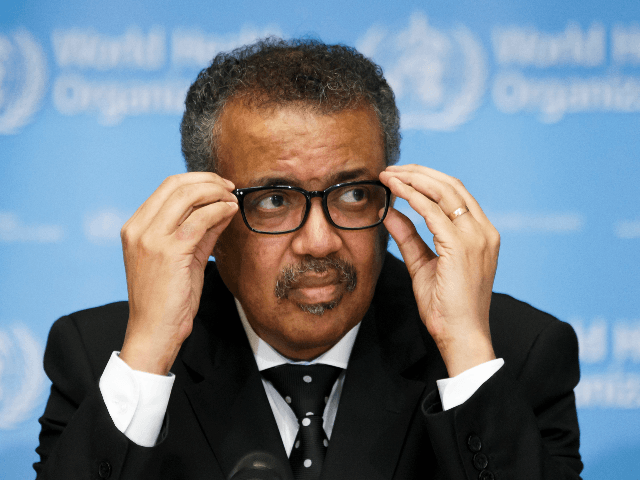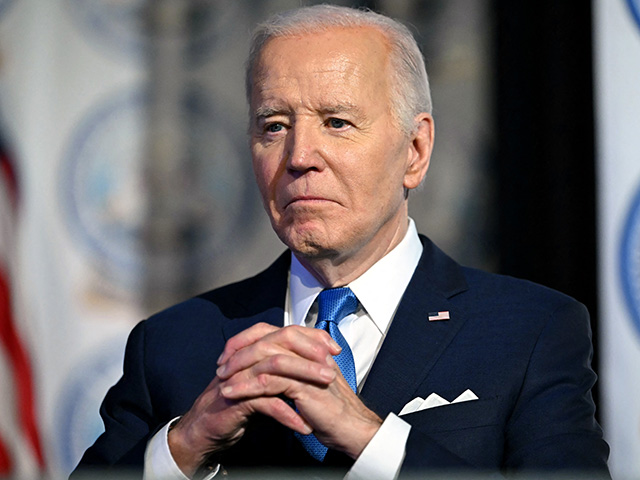World Health Organization (W.H.O.) member states will pursue amendments to its core legal document, the International Health Regulations (IHR), in Geneva this week, including provisions to make wealthier states invest more money in W.H.O. programs.
W.H.O. Director-General Tedros Adhanom Ghebreyesus has aggressively rejected all criticism of the WHO CA+ as the result of “misinformation” and “conspiracy theories,” calling the empowering of the W.H.O. to address public health emergencies “itself an exercise of sovereignty.”
Tedros Adhanom Ghebreyesus, Director General of the World Health Organization (Salvatore Di Nolfi/Keystone via AP)
The absence of an agreed-upon draft of the “pandemic agreement” at this year’s WHA redirects the energy of those seeking to empower the W.H.O. in light of its glaring failures during the Wuhan coronavirus pandemic towards the IHR. Voice of America observed on Monday that the “proposed amendments to the IHR, including adding more nuance to a system meant to alert countries to potential health emergencies of global concern, might have a better chance of being adopted during this week’s assembly, observers said.”
The IHR, unlike the pandemic “treaty,” is an existing document that W.H.O. member states, including America, have already signed onto. The administration of leftist President Joe Biden has been actively involved in attempting to amend the IHR since at least 2022.
US President Joe Biden attends the NAACP Detroit Branch annual “Fight for Freedom Fund Dinner” in Detroit, Michigan on May 19, 2024 (ANDREW CABALLERO-REYNOLDS/AFP via Getty Images).
Also unlike the pandemic agreement, on which little progress has been made since initial proposals to craft such a document began in 2021, the W.H.O. has since successfully amended the IHR. Following the 2023 WHA, member states changed the text of Article 59 of the IHR to specify that the W.H.O. has a 12-month deadline from when amendments have been adopted to formally implement them. The change is markedly less dramatic than amendments proposed by the Biden administration in 2022 to strengthen the W.H.O.’s ability to declare a pandemic.
Health Policy Watch, an industry publication, reported on Sunday that the co-chair of the IHR working group was hoping to finalize amendments to the document during 2024’s IHR.
Health Policy Watch cited unnamed sources who said that provisions mandating “equity” would require “stronger commitments by high-income states, such as the European Union, to support more predictable and sustainable financing for all countries in outbreak prevention.” The outlet claimed that the working group in charge of amendments had begun drafting 34 of them and finalized about half to present at the WHA.
The new amendments would also reportedly formally define what a “pandemic” is. There is no agreed upon international legal definition of a pandemic separate from other public health emergencies. After an unexplained delay in 2020, Tedros declared what would become the Wuhan coronavirus pandemic a “public health emergency of international concern” (PHEIC), the most severe alarm the W.H.O. can sound on a health issue.
“That would, in turn, activate the more far-reaching provisions of a future pandemic accord, should that new legal instrument be finally approved and ratified by countries,” Health Policy Watch noted.
The W.H.O. acknowledged “parallel negotiation processes” for the IHR amendments and the “pandemic treaty” on Friday.
Tedros conceded the existence of “challenges” but demanded WHA attendees “use the World Health Assembly to re-energize us and finish the job at hand, which is to present the world with a generational pandemic agreement.”
Tedros sounded a more optimistic tone in his remarks opening the WHA on Monday, emphasizing the WHO CA+ (the pandemic treaty) over the IHR amendments.
“Of course, we all wish that we had been able to reach a consensus on the agreement in time for this health assembly and crossed the finish line,” Tedros said. “But I remain confident that you still will, because where there is a will, there is a way.”
Tedros lamented what he called a “torrent of misinformation” about the pandemic accord and thanked negotiators for their “clear commitment to reaching an agreement.”
The first day of the WHA has so far focused on calls for funding, creating a new mechanism to attract $7 billion in investments to save for rapid deployment in the event of a future health emergency.






